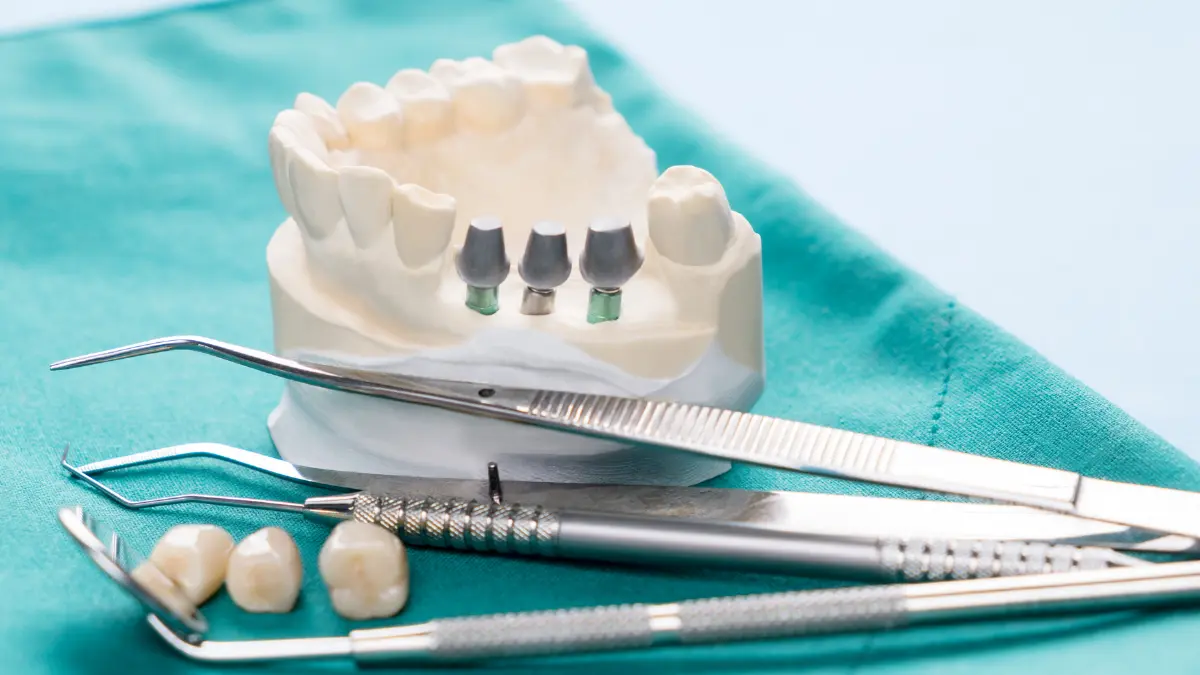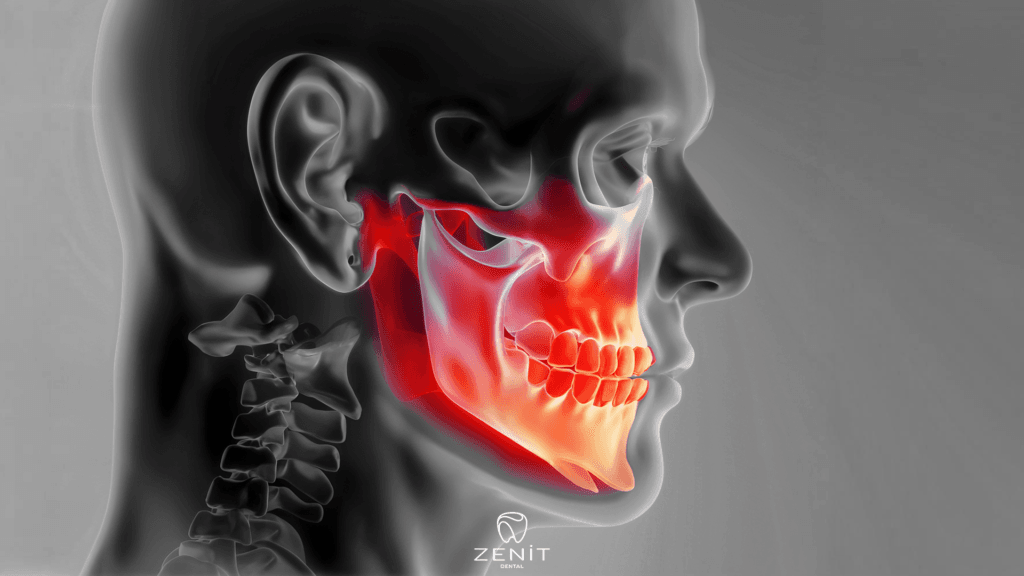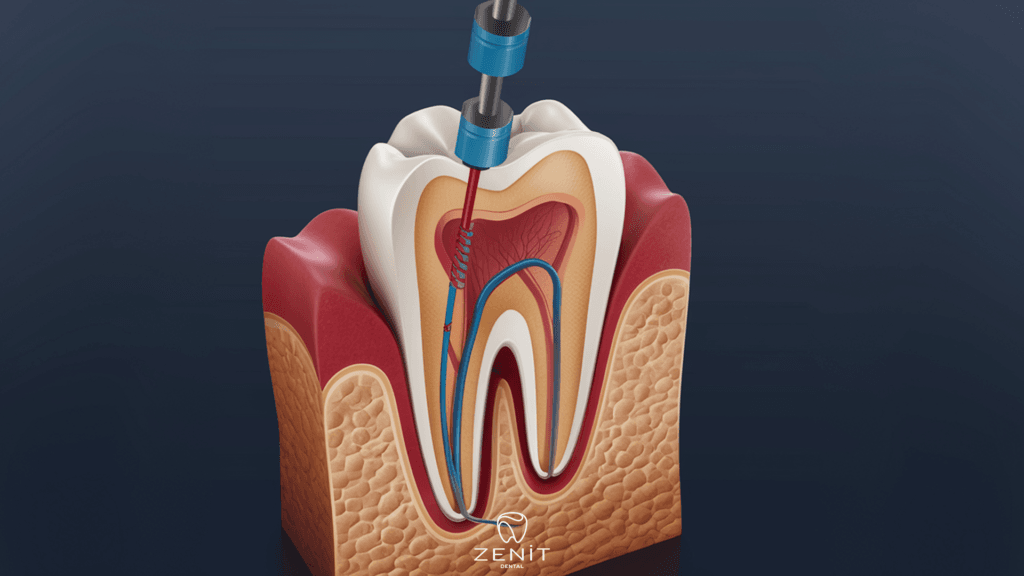Implant-supported dentures are a type of dental prosthesis that is supported by dental implants. Unlike traditional dentures, which rest on the gums and rely on suction or adhesive to stay in place, implant-supported dentures are attached to dental implants that are surgically placed in the jawbone. Here are some types and benefits of implant-supported dentures:
What Are İmplant-Supported Dentures?
Implant-supported dentures are a type of dental prosthetic that is used to replace missing teeth. Unlike traditional dentures, which rest on the gums and rely on suction or adhesives to stay in place, implant-supported dentures are anchored to dental implants that are surgically placed into the jawbone.
The dental implants used to support dentures are typically made of titanium, a biocompatible material that is well-tolerated by the human body. Over time, the implants fuse with the surrounding bone tissue in a process called osseointegration, creating a secure and stable foundation for the dentures.
There are two main types of implant-supported dentures: bar-retained and ball-retained. In a bar-retained denture, a thin metal bar is attached to the implants and the denture is secured to the bar with clips or other attachments. In a ball-retained denture, the implants have ball-shaped attachments on them that snap into corresponding sockets on the denture.
Implant-supported dentures can be used to replace all of the teeth in an arch (full arch) or just a few teeth (partial arch). They can also be removable or fixed, depending on the patient’s needs and preferences.
Benefits Of İmplant-Supported Dentures Compared To Traditional Dentures

Implant-supported dentures offer a number of advantages over traditional dentures. Some of the most significant benefits include:
Improved Stability And Comfort
Because implant-supported dentures are anchored to dental implants that are fused to the jawbone, they are much more stable and comfortable than traditional dentures. They do not slip or move around when eating, speaking, or laughing, which can be a major source of embarrassment and discomfort for many denture wearers.
Better Chewing Efficiency
Implant-supported dentures also allow for better chewing efficiency. Traditional dentures can make it difficult to eat certain foods, such as tough meats and crunchy vegetables, because they do not provide a strong enough bite force. With implant-supported dentures, patients can enjoy a wider variety of foods and maintain a healthy, balanced diet.
Improved Oral Health
Dental implants help to preserve the underlying jawbone by stimulating bone growth and preventing bone loss. This can help to maintain the structure and integrity of the face and prevent the sunken-in appearance that is often associated with traditional dentures.
Long-Lasting Results
Implant-supported dentures are designed to last for many years with proper care and maintenance. Traditional dentures, on the other hand, typically need to be replaced every five to seven years due to wear and tear.
Improved Confidence And Quality Of Life
Perhaps the most significant benefit of implant-supported dentures is the improved confidence and quality of life they provide. Patients who wear implant-supported dentures can smile, speak, and eat with confidence, without worrying about their dentures slipping or falling out. This can have a major impact on self-esteem and overall well-being.
Types Of İmplant-Supported Dentures

As mentioned earlier, there are two main types of implant-supported dentures: bar-retained and ball-retained. Within each category, there are several different options to choose from.
Bar-Retained Dentures
Bar-retained dentures consist of a thin metal bar that is attached to the dental implants and the denture is secured to the bar with clips or other attachments. There are two main types of bar-retained dentures:
1. Overdentures
Overdentures are removable dentures that are designed to be removed for cleaning and maintenance. They are typically held in place with clips or other attachments that snap onto the metal bar.
2. Hybrid dentures
Hybrid dentures, also known as fixed-detachable dentures, are a type of bar-retained denture that is permanently fixed in place. They are typically used to replace a full arch of teeth and are attached to the implants with screws or other attachments.
Ball-Retained Dentures
Ball-retained dentures, also known as stud-attachment dentures or overdentures, are held in place by small ball-shaped attachments on the implants that snap into corresponding sockets on the denture. There are two main types of ball-retained dentures:
1. Locator Dentures
Locator dentures use a series of small attachments that are shaped like cones and snaps into sockets on the denture. They are easy to clean and maintain and are a popular choice for patients who want a removable implant-supported denture.
2. O-Ring Dentures
O-ring dentures use a series of small rubber O-rings that snap into sockets on the denture. They are typically more affordable than other types of implant-supported dentures and are a good option for patients who have limited budgets.
What İs The Best Material For İmplant-Supported Dentures?

The best material for implant-supported dentures depends on a variety of factors, including the patient’s individual needs and preferences. Some of the most common materials used to make implant-supported dentures include:
Acrylic resin
Acrylic resin is a type of plastic that is commonly used to make traditional dentures. It is lightweight and easy to shape and can be tinted to match the color of the patient’s natural teeth. However, it is also more prone to wear and tear than other materials and may need to be replaced more frequently.
Zirconia
Zirconia is a type of ceramic material that is highly durable and resistant to wear and tear. It is also biocompatible and less likely to cause allergic reactions or inflammation. However, it is also more expensive than other materials and may not be covered by insurance.
Porcelain
Porcelain is a type of ceramic material that is often used to make dental crowns and other restorations. It is highly durable and resistant to staining, and can be tinted to match the color of the patient’s natural teeth. However, it is also more brittle than other materials and may not be suitable for patients who grind their teeth or have a history of clenching.
Hybrid Materials
Hybrid materials, such as acrylic resin with a titanium base or zirconia with a porcelain overlay, offer the benefits of both materials and can be customized to meet the patient’s individual needs and preferences.
In conclusion, implant-supported dentures are an excellent option for patients who are missing one or more teeth and want a stable, comfortable, and long-lasting solution. They offer a number of benefits over traditional dentures, including improved stability and comfort, better chewing efficiency, improved oral health, long-lasting results, and improved confidence and quality of life. Patients should work closely with their dentist to determine the best type of implant-supported dentures and material for their individual needs and preferences.






